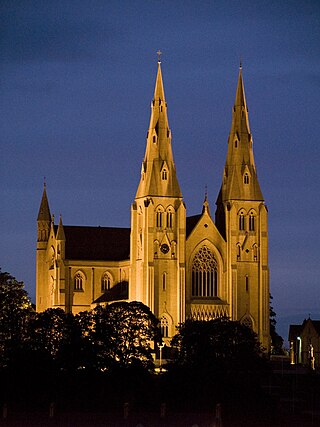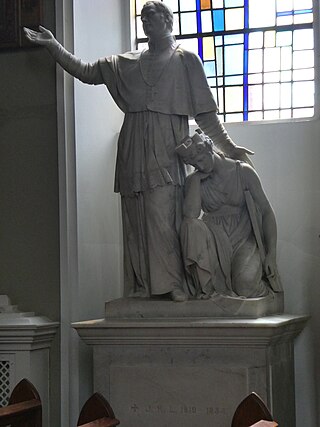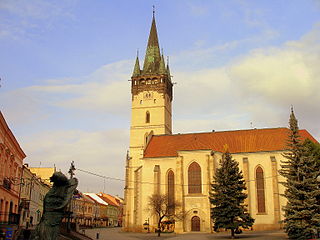Related Research Articles
The Dutch Reformed Church was the largest Christian denomination in the Netherlands from the onset of the Protestant Reformation in the 16th century until 1930. It was the original denomination of the Dutch royal family and the foremost Protestant denomination until 2004. It was the larger of the two major Reformed denominations, after the Reformed Churches in the Netherlands was founded in 1892. It spread to the United States, South Africa, Indonesia, Sri Lanka, Brazil, and various other world regions through Dutch colonization. Allegiance to the Dutch Reformed Church was a common feature among Dutch immigrant communities around the world and became a crucial part of Afrikaner nationalism in South Africa.
The Irish Church Missions (ICM) is a conservative and semi-autonomous Anglican mission. It was founded in 1849 as The Irish Church Missions to the Roman Catholics chiefly by English Anglicans though with the backing and support of Church of Ireland clergy and bishops, with the aim of converting the Roman Catholics of Ireland to Protestantism. The reference to Roman Catholics in the title was removed in 2001.

The Protestant Ascendancy was the sociopolitical and economical domination of Ireland between the 17th and early 20th centuries by a small Anglican ruling class, whose members consisted of landowners, politicians, clergymen, military officers and other prominent professions. They were either members of the Church of Ireland or the Church of England and wielded a disproportionate amount of social, cultural and political influence in Ireland. The Ascendancy existed as a result of British rule in Ireland, as land confiscated from the Irish Catholic aristocracy was awarded by the Crown to Protestant settlers from Great Britain. As a result of the Ascendancy's dominance, Irish Catholics, Presbyterians and other Protestant denominations and Jews were excluded from holding prominent officers in Ireland until the 1832 Reform Acts.

Anti-Protestantism is bias, hatred or distrust against some or all branches of Protestantism and/or its followers, especially when amplified in legal, political, ethic or military measures.

John MacHale was the Irish Roman Catholic Archbishop of Tuam, and Irish nationalist.

The Catholic Church in Ireland or Irish Catholic Church, is part of the worldwide Catholic Church in communion with the Holy See. With 3.7 million members, it is the largest Christian church in Ireland. In the Republic of Ireland's 2016 census, 78% of the population identified as Catholic; this was 6% lower than the 2011 figure. By contrast, 41% of people in Northern Ireland identified as Catholic at the 2011 census; it is expected that this proportion will increase in the coming years. The Archbishop of Armagh, as the Primate of All Ireland, has ceremonial precedence in the church. The church is administered on an all-Ireland basis. The Irish Catholic Bishops' Conference is a consultative body for ordinaries in Ireland.

The history of Ireland from 1691–1800 was marked by the dominance of the Protestant Ascendancy. These were Anglo-Irish families of the Anglican Church of Ireland, whose English ancestors had settled Ireland in the wake of its conquest by England and colonisation in the Plantations of Ireland, and had taken control of most of the land. Many were absentee landlords based in England, but others lived full-time in Ireland and increasingly identified as Irish.. During this time, Ireland was nominally an autonomous Kingdom with its own Parliament; in actuality it was a client state controlled by the King of Great Britain and supervised by his cabinet in London. The great majority of its population, Roman Catholics, were excluded from power and land ownership under the penal laws. The second-largest group, the Presbyterians in Ulster, owned land and businesses but could not vote and had no political power. The period begins with the defeat of the Catholic Jacobites in the Williamite War in Ireland in 1691 and ends with the Acts of Union 1800, which formally annexed Ireland in a United Kingdom from 1 January 1801 and dissolved the Irish Parliament.

The term Evangelical Catholic is used in Lutheranism, alongside the terms Augsburg Catholic or Augustana Catholic, with those calling themselves Evangelical Catholic Lutherans or Lutherans of Evangelical Catholic churchmanship stressing the catholicity of historic Lutheranism in liturgy, beliefs, practices, and doctrines. Evangelical Catholics teach that Lutheranism at its core "is deeply and fundamentally catholic". The majority of Evangelical Catholic Lutheran clergy and parishes are members of mainstream Lutheran denominations.

The Rt Hon. Henry Maxwell, 7th Baron Farnham, K.P., was an Irish peer, a Member of Parliament, an evangelical Orangeman and County Cavan landowner. During the hunger years of late 1820s and late 1840s, he was much reviled for evicting tenants and for offering relief only on condition of conversion to Protestantism.

The Archdiocese of Tuam is an Latin Church ecclesiastical territory or archdiocese of the Catholic Church located in western Ireland. The archdiocese is led by the Archbishop of Tuam, who serves as pastor of the mother church, the Cathedral of the Assumption and Metropolitan of the Metropolitan Province of Tuam. According to tradition, the "Diocese of Tuam" was established in the 6th century by St. Jarlath. The ecclesiastical province, roughly co-extensive with the secular province of Connacht, was created in 1152 by the Synod of Kells.

Margaret Anna Cusack, also known as Sister Mary Francis Cusack and Mother Margaret, was first an Irish Anglican nun, then a Roman Catholic nun, then a religious sister and the founder of the Sisters of St. Joseph of Peace, and then an Anglican. By 1870 more than 200,000 copies of her works which ranged from biographies of saints to pamphlets on social issues had circulated throughout the world, the proceeds from which went towards victims of the Famine of 1879 and helping to feed the poor.

James Warren Doyle, OESA (1786–1834) was a Roman Catholic Bishop of Kildare and Leighlin in Ireland, who used the signature "JKL", an acronym from "James Kildare and Leighlin." Doyle was active in the Anti-Tithe movement. A campaigner for Catholic Emancipation until it was attained in 1829, he was also an educator, church organiser and the builder of Carlow cathedral.
In Germany and Switzerland, a Landeskirche is the church of a region. The term usually refers to Protestant churches, but—in case of Switzerland—also Roman Catholic dioceses. They originated as the national churches of the independent states, States of Germany (Länder) or Cantons of Switzerland , that later unified to form modern Germany or modern Switzerland, respectively.
Thomas Span Plunket, 2nd Baron Plunket (1792–1866), was Bishop of Tuam, Killaly and Achonry.

In 16th-century Christianity, Protestantism came to the forefront and marked a significant change in the Christian world.

Anti-Catholicism in the United Kingdom dates back to Roman times. Attacks on the Church from a Protestant angle mostly began with the English and Irish Reformations which were launched by King Henry VIII and the Scottish Reformation which was led by John Knox. Within England, the Act of Supremacy 1534 declared the English crown to be "the only supreme head on earth of the Church in England" in place of the Pope. Any act of allegiance to the latter was considered treasonous because the papacy claimed both spiritual and political power over its followers. Ireland was brought under direct English control starting in 1536 during the Tudor conquest of Ireland. The Scottish Reformation in 1560 abolished Catholic ecclesiastical structures and rendered Catholic practice illegal in Scotland. Today, anti-Catholicism remains common in the United Kingdom, with particular relevance in Scotland and Northern Ireland.

Protestantism is a branch of Christianity that emphasizes justification by God through faith alone, the teaching that salvation comes by unmerited divine grace, the priesthood of all believers, and the Bible as the sole infallible source of authority for Christian faith and practice. The five solae summarize the basic theological beliefs of mainstream Protestantism.

Power Le Poer Trench (1770–1839) was an Anglican clergyman who served in the Church of Ireland as firstly Bishop of Waterford and Lismore, then Bishop of Elphin and finally Archbishop of Tuam.
Christian revivalism is increased spiritual interest or renewal in the life of a Christian church, congregation or society with a local, national or global effect. This should be distinguished from the use of the term "revival" to refer to an evangelistic meeting or series of meetings. Proponents view revivals as the restoration of the church to a vital and fervent relationship with God after a period of moral decline.

Edward Nangle was a Church of Ireland minister and the founder of the Achill Mission Colony. He established a Protestant mission on Achill Island, County Mayo, in 1834 and worked there for eighteen years with the aim of bringing Protestantism to the Native Irish Christians who were impoverished in large part due to the Penal Law policies of the Protestant Ascendancy. Edward Nangle was involved in evangelical attempts to convert Catholics to Protestantism. He opened a Christian school on the island where children were taught reading, writing, agricultural skills and Christianity as part of a Missionary Colony. His presence on the island led to some press coverage and parliamentary debates. The island itself was developed with a pier built at Dugort, a courthouse at Achill Sound and a road network between numerous key locations on the island. A plaque hanging in St. Thomas Church, Dugort, dedicated to Edward Nangle and erected by friends after his death, reads: "He devoted his life from the year 1834 to the welfare of the people of Achill among whom he lived for many years."
References
- Michalski, Sergiusz. Reformation and the Visual Arts: The Protestant Image Question in Western and Eastern Europe, Routledge, 1993, ISBN 0-203-41425-X, 9780203414255 Google Books
- Irene Whelan (2005), The Bible War in Ireland: The Second Reformation and the Polarization of Protestant-Catholic Relations, 1800–1840
- Desmond Bowen (1978), "The Protestant Crusade in Ireland, 1800-70"